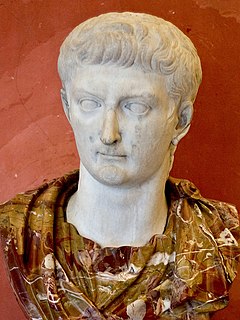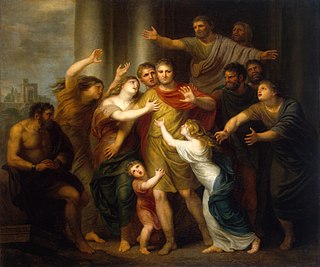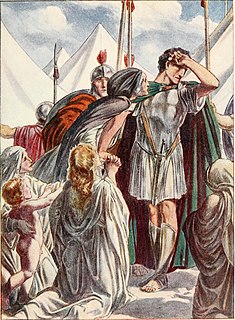Related Research Articles

The Second Triumvirate was a political alliance formed after the Roman dictator Julius Caesar's assassination, comprising Caesar's adopted son Octavian and the dictator's two most important supporters, Mark Antony and Marcus Aemilius Lepidus. The triumvirate for organizing the republic, as it was formally known, ruled the Roman Republic essentially as a military dictatorship, with each of the triumvirs assuming charge of an individual set of provinces. Unlike the earlier First Triumvirate, the Second was an official, legally established institution, whose overwhelming power in the Roman state was given full legal sanction and whose authority outranked that of all other magistrates, including the consuls.

The First, Second, and Third Samnite Wars were fought between the Roman Republic and the Samnites, who lived on a stretch of the Apennine Mountains south of Rome and north of the Lucanians.

The gens Claudia, sometimes written Clodia, was one of the most prominent patrician houses at ancient Rome. The gens traced its origin to the earliest days of the Roman Republic. The first of the Claudii to obtain the consulship was Appius Claudius Sabinus Regillensis, in 495 BC, and from that time its members frequently held the highest offices of the state, both under the Republic and in imperial times.

The Social War, also called the Italian or Marsic War, was fought from 91 to 87 BC between the Roman Republic and several of its autonomous allies in Italy. The Italian allies wanted Roman citizenship, not only for the status and influence that came with it, but also for the right to vote in Roman elections and laws. They believed that they should be treated equally to the Romans, given that they had formed cultural and linguistic connections with the Roman civilization, and had been their loyal allies for over two centuries. The Romans strongly opposed their demands, and refused to grant them citizenship, thus leaving the Italian groups with fewer rights and privileges.

In ancient Rome a promagistrate was an ex-consul or ex-praetor whose imperium was extended at the end of his annual term of office or later. They were called proconsuls and propraetors. This was an innovation created during the Roman Republic. Initially it was intended to provide additional military commanders to support the armies of the consuls or to lead an additional army. With the acquisitions of territories outside Italy which were annexed as provinces, proconsuls and propraetors became provincial governors or administrators. A third type of promagistrate were the proquaestors.

A dictator was a magistrate of the Roman Republic, entrusted with the full authority of the state to deal with a military emergency or to undertake a specific duty. All other magistrates were subordinate to his imperium, and the right of the plebeian tribunes to veto his actions or of the people to appeal from them was extremely limited. In order to prevent the dictatorship from threatening the state itself, severe limitations were placed upon its powers, as a dictator could only act within his intended sphere of authority, and was obliged to resign his office once his appointed task had been accomplished, or at the expiration of six months. Dictators were frequently appointed from the earliest period of the Republic down to the Second Punic War, but the magistracy then went into abeyance for over a century, until it was revived in a significantly modified form, first by Sulla between 82 and 79 BC, and then by Julius Caesar between 49 and 44 BC. The office was formally abolished after the death of Caesar, and not revived under the Empire.
The Populares were a political faction in the late Roman Republic who favoured the cause of the plebeians.

A proconsul was an official of ancient Rome who acted on behalf of a consul. A proconsul was typically a former consul. The term is also used in recent history for officials with delegated authority.
Tribune of the plebs, tribune of the people or plebeian tribune was the first office of the Roman state that was open to the plebeians, and was, throughout the history of the Republic, the most important check on the power of the Roman Senate and magistrates. These tribunes had the power to convene and preside over the Concilium Plebis ; to summon the senate; to propose legislation; and to intervene on behalf of plebeians in legal matters; but the most significant power was to veto the actions of the consuls and other magistrates, thus protecting the interests of the plebeians as a class. The tribunes of the plebs were sacrosanct, meaning that any assault on their person was punishable by death. In imperial times, the powers of the tribunate were granted to the emperor as a matter of course, and the office itself lost its independence and most of its functions. It was customary for the tribunes to be seated on the tribune benches on the Forum Romanum every day.

Publius Valerius Poplicola or Publicola was one of four Roman aristocrats who led the overthrow of the monarchy, and became a Roman consul, the colleague of Lucius Junius Brutus in 509 BC, traditionally considered the first year of the Roman Republic.

A consul held the highest elected political office of the Roman Republic, and ancient Romans considered the consulship the second-highest level of the cursus honorum after that of the censor. Each year, the Centuriate Assembly elected two consuls to serve jointly for a one-year term. The consuls alternated in holding fasces each month when both were in Rome and a consul's imperium extended over Rome and all its provinces.

The gens Cornelia was one of the greatest patrician houses at ancient Rome. For more than seven hundred years, from the early decades of the Republic to the third century AD, the Cornelii produced more eminent statesmen and generals than any other gens. At least seventy-five consuls under the Republic were members of this family, beginning with Servius Cornelius Maluginensis in 485 BC. Together with the Aemilii, Claudii, Fabii, Manlii, and Valerii, the Cornelii were almost certainly numbered among the gentes maiores, the most important and powerful families of Rome, who for centuries dominated the Republican magistracies. All of the major branches of the Cornelian gens were patrician, but there were also plebeian Cornelii, at least some of whom were descended from freedmen.

Marcus Atilius Regulus was a Roman statesman and general who was a consul of the Roman Republic in 267 BC and 256 BC.

The gens Marcia, occasionally written Martia, was one of the oldest and noblest houses at ancient Rome. They claimed descent from the second and fourth Roman Kings, and the first of the Marcii appearing in the history of the Republic would seem to have been patrician; but all of the families of the Marcii known in the later Republic were plebeian. The first to obtain the consulship was Gaius Marcius Rutilus in 357 BC, only a few years after the passage of the lex Licinia Sextia opened this office to the plebeians.

The Forum of Augustus is one of the Imperial fora of Rome, Italy, built by Augustus. It includes the Temple of Mars Ultor. The incomplete forum and its temple were inaugurated in 2 BC, 40 years after they were first vowed.
The gens Servilia was a patrician family at ancient Rome. The gens was celebrated during the early ages of the Republic, and the names of few gentes appear more frequently at this period in the consular Fasti. It continued to produce men of influence in the state down to the latest times of the Republic, and even in the imperial period. The first member of the gens who obtained the consulship was Publius Servilius Priscus Structus in 495 BC, and the last of the name who appears in the consular Fasti is Quintus Servilius Silanus, in AD 189, thus occupying a prominent position in the Roman state for nearly seven hundred years.
The Roman-Aequian wars were a series of wars during the early expansion of ancient Rome in central Italy against their eastern neighbours, the Aequi.
References
- ↑ Livius Periochae, 46, 15
- ↑ Smith, William (1870). Dictionary of Greek and Roman biography and mythology. 1. Boston, Little. p. 675.